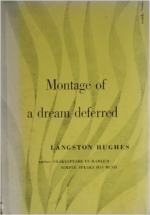|
This section contains 1,296 words (approx. 4 pages at 400 words per page) |

|
In the following excerpt, Farrell and Johnson examine how Hughes's poetry reflects the mood, tone, and culture of the music of post-WWII Harlem.
The "bebop era" was also one of unrest, anxiety, and massive discontent in the urban ghetto. Harlem, for example, was the scene of a bloody race riot in 1943. The just indignation of Afro-American people had finally surfaced in the form of massive violence. But the injustice of racism and poverty was only compounded by the injustices of police brutality. Black urban workers found themselves not only trapped in the ghetto but pinned beneath the heel of police repression as well.
Langston Hughes was among the few black intellectuals of this era to sympathize with justly aggrieved poor people in Harlem. In a 1944 edition of Negro Digest, he denounced the snobbery of "Sugar Hill" Negroes who viewed the riot as a deterrent to "Negro advancement...
|
This section contains 1,296 words (approx. 4 pages at 400 words per page) |

|




